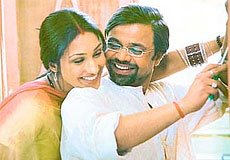Search Hollywood Bollywood News & Gossips



Bollywood is beginning to move out of the megalopolis of Mumbai. Bred in cultural milieus far removed from the glitz and glamour of tinsel town, a new crop of filmmakers from around the country are crafting the future of a mass entertainment industry that is in urgent need of a thorough overhaul.
Films like Bunty Aur Babli, Hazaaron Khwaishein Aisi and Rang De Basanti, to name just three, represent intimations of a future that is refreshingly free from designer vacuities and is informed with an earthy sensibility capable of capturing the essence of the real India. These films have set the guardians of mainstream Mumbai cinema thinking.
The woolly-headed reveries of designer flicks seem to have outlived their utility. Popular Hindi cinema is today much more about the ebbs and tides of politics, the hopes of small town denizens and the dynamics of mofussil societies. Mumbai cinema is getting real.
The movement is being driven by a band of filmmakers spearheaded by established names like Prakash Jha and Sudhir Mishra. Vishal Bhardwaj, Rakeysh Omprakash Mehra, Shaad Ali, Anurag Kashyap and Tigmanshu Dhulia, among others, are contributing their mite in significant new ways. They have dragged a substantial chunk of Mumbai cinema away from its pretty, glamour-driven plasticity and invested it with a gritty grey cells.
The efforts of these rooted and quality conscious filmmakers are being aided and abetted by the writing skills of men like Garhwal’s Prasoon Joshi (dialogues for Rang De Basanti), Lucknow’s Kamlesh Pandey (script of Rang De Basanti) and Indore’s Swanand Kirkire (dialogues for Chameli and lyrics for Parineeta). The core of a part of Hindi cinema is, therefore, poised to change completely.
All these years, the spirit of adventure and non-conformism that this brand of reality-oriented cinema represents was once largely confined to the fringes of the industry. It has taken centrestage today.
Rakeysh Mehra may not exactly be a small town boy, but his old Delhi roots are clearly evident in Rang De Basanti. He has turned Mumbai commercial cinema on its head with his unconventional but super-successful entertainer. Much of the power and energy of RDB clearly stem from its tangible, identifiable set of characters and narrative backdrop.
It is not just unusual songs, folksy choreography and nifty dialogues that have cast a magic spell on Bollywood watchers. A string of stylish, cinematically rich films made in the last few years by gifted storytellers from small-town India have provided tired audiences with an alternative to the mush and mayhem of conventional Mumbai cinema. The audience is understandably asking for more.
Some of these off-mainstream films have been clicked, others haven’t. Kabeer Kaushik’s UP underworld thriller Seher or Chandan Arora’s small town middle class marital comedy Main Meri Patni Aur Woh, both set and shot in Lucknow, and Tigmanshu Dhulia’s Haasil, a love story located against the backdrop of murky university politics, failed at the box office. But they all helped Mumbai cinema mature and diversify.
So, are these signs of a probable return to the golden era of Hindi cinema, represented by the work of such greats as Bimal Roy, Guru Dutt and Raj Kapoor?
Hope springs from the sheer quality of the work of some of these filmmakers. When Vishal Bhardwaj makes a children’s film (Makdee), it doesn’t look like one. It treats its audience with the respect it deserves. Or when he turns William Shakespeare’s Macbeth into a gangster drama shot primarily in Bhopal (Maqbool), he makes the transition look like the easiest thing on earth. Bhardwaj is currently working on Omkara, a cinematic reworking of Othello.
“This had to happen,” says Anurag Kashyap, maker of such talked about films as Paanch and Black Friday, about the invasion. “The change is now too fast and furious for the Bollywood big guns to control.”
“The Bombay boys have lost touch with reality,” says Sudhir Mishra, who grew up in Lucknow and spent his formative years on the campus of Sagar University.
The Bollywood ‘outsiders’ – migrants from upcountry locations like Meerut, Allahabad and Patna – are on a stronger wicket than the local practitioners of the movie trade. “The reference points of Mumbai-born filmmakers are severely limited,” says Prakash Jha.
No wonder the centre of the brave, bold new Bollywood has shifted.
0 Comments:
Popular Posts
-
Bipasha Basu: The best Bengali bombshell.. She started the trend with Jism, which was followed by almost every actress intinsel town. Being ...
-
Name: Yoko Mitsuya (三津谷葉子) Birthdate: November 8th, 1984 Birthplace: Tokyo, Japan Blood type: O Height: 165cm Bust: 87cm (E cup) Waist: 60cm...
-
As the maid of honour for her sister Kate she will be taking her place in history in the biggest wedding this country has seen in decades. B...
-
Birth name Leah Donna Dizon Born September 24, 1986 (1986-09-24) (age 21) Origin Las Vegas, Nevada, US Genre(s) J-pop Occupation(s)...
-
A local court on Friday issued non-bailable warrants against actors Shilpa Shetty and Reema Sen for "posing in an obscene manner" ...
-
Name :Lara Dutta Birth date : April 16, 1978 Height : 5'8 Hobbies : Bungee- jumping, para-gliding, white water rafting etc. Profession ...
-
Banner Ramesh Sippy Entertainment Fox Star Studios Status Released Color C Release Date April 22, 2011 Language Hindi Genre Thriller Shootin...











